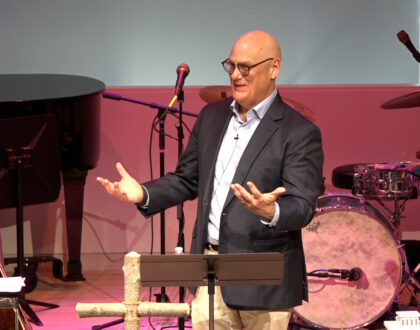What Does It Mean to Live In Faith?
We have been celebrating 75 years of faith at Woodmont, dating back to 1943. But what does it mean to live a life of faith?
There are many misunderstandings in our culture of what it means. At its very core, this question lies at the heart of all theology, a field that will never be exhausted or mastered. Having faith in God does not mean that everything in life will work out just the way we plan. It does not mean that we will be spared hardship and pain, tragedy, and suffering. Faith in God does not mean simply biding our time and waiting to go to heaven one day when we die. It does not mean that there is a master puppeteer in the sky, orchestrating our every move.
Humans do have free will and responsibility. Bad things do happen to all of us. Pain and suffering are real and part of the human condition. So then what is faith, and what does it mean to be a person of faith?
The writer to the Hebrews says: “Faith is the assurance of things hoped for, the conviction of things not seen.” According to these words, faith and hope are intertwined, two sides of the same coin, perhaps inseparable. Without faith, there is no hope. Without hope, no faith.
St. Augustine once said that, “Faith is to believe what you do not see; the reward of this faith is to see what you believe.” Thomas Aquinas once said, “To one who has faith, no explanation is necessary; to one without faith, no explanation is possible.” Charles Spurgeon preached that, “Faith obliterates time, annihilates distance, and brings future things at once into its possession.” Emmanuel Teney once argued that, “As our faith is strengthened, we will find that there is no longer a need to have a sense of control; things will flow as they will and to our great delight and benefit, we will flow with them.”
The truth is, there is no one definitive definition of faith. Faith is a way of being, a way of living, a way of approaching the future. It involves being open to the spirit. Faith gives us courage in the face of fear and hope in the face of disappointment. It is is trusting that life will go on, even after bad things happen. Faith means learning to not be trapped or owned by things that have happened in the past. The past should not and does not define us. Guilt and shame can be overcome. Faith is learning to see the world through a different lens. It’s not an escape from reality but a refusal to accept that this is all that there is. There is always more.
Faith means believing that we can leave the world better than we found it. It involves not getting bogged down by the trivial matters of life, the things that are insignificant in the big picture. Living in faith means moving beyond a world of superficiality, materialism, resentment, fear, and control. It is embracing the mystery of creation and the joy of everyday existence. Living in faith means reminding ourselves that we are all on a journey and we simply don’t know or control the future. Faith can lead us to peace, even in the midst of chaos and stress. Therefore humility, gratitude, love, and presence matter in cultivating a life of faith.
Recommended Posts

Loving God, Loving Nashville
April 24, 2024

Authenticity in a Social Media World
April 16, 2024

“Leveraging Our Love” – Jay Hutchens – April 14, 2024
April 14, 2024

